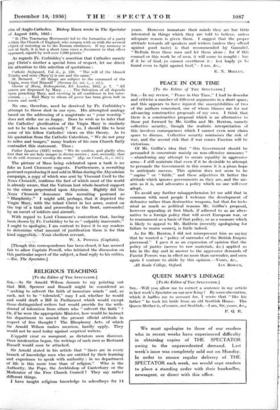PEACE IN OUR TIME
[To the Editor of THE SPECTATOR.] Sni,—In my review, "Peace in Our Time," I had to describe and criticise a number of different arguments in a short space,
and this appears to have injured the susceptibilities of two of the authors concerned, one of whom blames me for not advancing constructive proposals of my own. I think that there is a constructive proposal which is an alternative to those put forward by Mr. Griffin and Mr. Buxton, namely collective security, though the realistic interpretation of
this involves -consequences which I cannot even now claim space to discuss. Collective security minimises the risk of war, and the second risk that if war conies Fascism will be victorious.
Of Mr. Griffin's idea that "this Government should be persuaded to concentrate mainly on non-offensive measures"
—abandoning any attempt to secure equality in aggressive arms—I still maintain that even if it be desirable to attempt to persuade the Government in this course it is a pious hope to anticipate success. This opinion does not seem to be " supine " or "futile," and these adjectives fit better the attitude which ignores governments as they are, and the air- arm as it is, and advocates a policy which no one will ever adopt.
• To avoid any further misapprehension let me add that in common with most people I welcome the development of defensive rather than destructive weapons, but that for tech- nical as much as political reasons Mr. Griffin's proposal, however appealing at first blush, if adhered to as an alter- native to a foreign policy that will avert European war, or to rearmament as a basis of that policy, or as a measure which is likely to appeal to Mr. Baldwin (recently apologising for failure to rearm sooner), is futile indeed.
As for Mr. Buxton, I did not misrepresent him as saying that he wanted a "policy of surrender of the British Empire piecemeal." I gave it as an expression of opinion that the policy of justice (access to raw materials, &c.) applied so late in the day and in answer to the aggressive demands of Fascist Powers was in effect no more than surrender, and once again I venture to abide by this opinion.—Yours, &c.,










































 Previous page
Previous page